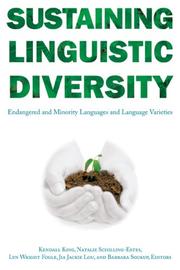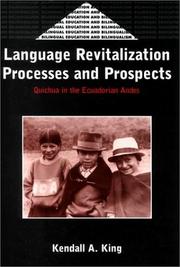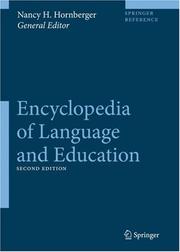| Listing 1 - 5 of 5 |
Sort by
|
Book
ISBN: 3319022490 3319022482 Year: 2017 Publisher: New York, New York : Springer,
Abstract | Keywords | Export | Availability | Bookmark
 Loading...
Loading...Choose an application
- Reference Manager
- EndNote
- RefWorks (Direct export to RefWorks)
In this third, fully revised edition, the 10 volume Encyclopedia of Language and Education offers the newest developments, including an entirely new volume of research and scholarly content, essential to the field of language teaching and learning in the age of globalization. In the selection of topics and contributors, the Encyclopedia reflects the depth of disciplinary knowledge, breadth of interdisciplinary perspective, and diversity of socio-geographic experience in the language and education field. Throughout, there is an inclusion of contributions from non-English speaking and non-western parts of the world, providing truly global coverage. Furthermore, the authors have sought to integrate these voices fully into the whole, rather than as special cases or international perspectives in separate sections. The Encyclopedia is a necessary reference set for every university and college library in the world that serves a faculty or school of education, as well as being highly relevant to the fields of applied and socio-linguistics. The publication of this work charts the further deepening and broadening of the field of language and education since the publication of the first edition of the Encyclopedia in 1997 and the second edition in 2008.
Education. --- Applied linguistics. --- Educational policy. --- ducation and state. --- Language and education. --- Literacy. --- Language Education. --- Applied Linguistics. --- Educational Policy and Politics. --- Language and languages. --- Illiteracy --- Education --- General education --- Linguistics --- Foreign languages --- Languages --- Anthropology --- Communication --- Ethnology --- Information theory --- Meaning (Psychology) --- Philology --- Language and education --- Research --- Methodology. --- Educational linguistics --- Language and languages

ISBN: 1461913748 1589014162 1589011929 9781461913740 9781589014169 9781589011922 Year: 2008 Publisher: Washington, D.C. Georgetown University Press
Abstract | Keywords | Export | Availability | Bookmark
 Loading...
Loading...Choose an application
- Reference Manager
- EndNote
- RefWorks (Direct export to RefWorks)
In the last three decades the field of endangered and minority languages has evolved rapidly, moving from the initial dire warnings of linguists to a swift increase in the number of organizations, funding programs, and community-based efforts dedicated to documentation, maintenance, and revitalization. Sustaining Linguistic Diversity brings together cutting-edge theoretical and empirical work from leading researchers and practitioners in the field. Together, these contributions provide a state-of-the-art overview of current work in defining, documenting, and developing the world's smaller lang
Language attrition. --- Linguistic minorities. --- Language revival. --- Language policy. --- Glottopolitics --- Institutional linguistics --- Language and languages --- Language and state --- Languages, National --- Languages, Official --- National languages --- Official languages --- State and language --- Language renewal --- Language revitalization --- Renewal, Language --- Restoration of languages --- Revitalization, Language --- Revival of languages --- Minority languages --- Language loss --- Government policy --- Restoration --- Revival --- Language policy --- Language revival --- Linguistic minorities --- Language attrition --- Bilingualism --- Sociolinguistics --- Communication policy --- Language planning --- Minorities --- Political aspects

ISBN: 1280827831 9786610827831 9781853597073 1853597074 9781853597077 1853594954 9781853594953 1853594954 1853594946 9781853594953 9781853594946 Year: 2001 Publisher: Bristol Blue Ridge Summit
Abstract | Keywords | Export | Availability | Bookmark
 Loading...
Loading...Choose an application
- Reference Manager
- EndNote
- RefWorks (Direct export to RefWorks)
This work explores educational and community efforts to revitalize the Quichua language in two indigenous Andean communities of southern Ecuador. Analyzing the linguistic, social, and cultural processes of positive language shift, this book contributes to our understanding of formal and informal educational efforts to revitalize threatened languages.
Quechua language --- Quechua Indians --- Communication and culture --- Education, Bilingual --- Code switching (Linguistics) --- Language shift --- Switching (Linguistics) --- Bilingualism --- Linguistics --- Diglossia (Linguistics) --- Bilingual education --- Multilingual education --- Culture and communication --- Culture --- Kechua Indians --- Kichwa Indians --- Napo Kichwa Indians --- Quichua Indians --- Indians of South America --- Inca language --- Kechua language --- Quichua language --- Runasimi language --- Cacán language --- Study and teaching --- Grammar. --- Ethnic identity. --- Languages --- Saraguro Region (Ecuador) --- Social life and customs. --- Script switching (Linguistics) --- Language Revitalization. --- Quichua. --- indigenous language.


ISBN: 038730424X 0387328750 0387354204 9780387328751 Year: 2008 Publisher: New York, N.Y. : Springer,
Abstract | Keywords | Export | Availability | Bookmark
 Loading...
Loading...Choose an application
- Reference Manager
- EndNote
- RefWorks (Direct export to RefWorks)
In this second, fully revised edition, the 10 volume Encyclopedia of Language and Education offers the newest developments including two new volumes of research and scholarly content essential to the field of language teaching and learning in the age of globalization. In the selection of topics and contributors, the Encyclopedia reflects the depth of disciplinary knowledge, breadth of interdisciplinary perspective, and diversity of sociogeographic experience in the field. Throughout, there is an inclusion of contributions from non-English speaking and non-western parts of the world, providing truly global coverage. The Encyclopedia is a necessary reference set for every university and college library in the world that serves a faculty or school of education. Vol.1: Language Policy and Political Issues in Education; Vol.2: Literacy; Vol.3: Discourse and Education; Vol.4: Second and Foreign Language Education; Vol.5: Bilingual Education; Vol.6: Knowledge About Language Vol.7: Lanaguage Testing and Assessment; Vol.8: Language Socialization; Vol.9: Ecology of Language; Vol.10: Research Methods in Language and Education. Please note that this publication is available as print only OR online only OR print + online set. Save 75% of the online list price when purchasing the bundle. For more information on the online version please type the publication title into the search box above, then click on the “eReference” version in the results list.
Education. --- Applied linguistics. --- Psycholinguistics. --- Sociolinguistics. --- Language and education. --- Language Education. --- Applied Linguistics. --- Education, general. --- Education, Bilingual --- Minorities --- Education --- Ethnic minorities --- Foreign population --- Minority groups --- Persons --- Assimilation (Sociology) --- Discrimination --- Ethnic relations --- Majorities --- Plebiscite --- Race relations --- Segregation --- Bilingual education --- Bilingualism --- Multilingual education --- Language and languages. --- Language and languages --- Language and society --- Society and language --- Sociology of language --- Language and culture --- Linguistics --- Sociology --- Integrational linguistics (Oxford school) --- Language, Psychology of --- Psychology of language --- Speech --- Psychology --- Thought and thinking --- Foreign languages --- Languages --- Anthropology --- Communication --- Ethnology --- Information theory --- Meaning (Psychology) --- Philology --- Social aspects --- Sociological aspects --- Psychological aspects --- Children --- Education, Primitive --- Education of children --- Human resource development --- Instruction --- Pedagogy --- Schooling --- Students --- Youth --- Civilization --- Learning and scholarship --- Mental discipline --- Schools --- Teaching --- Training --- Educational linguistics --- Psycholinguistics and Cognitive Lingusitics. --- Study and teaching. --- Language and languages Study and teaching --- Study and teaching --- Language and education --- Language schools --- Language policy --- Literacy --- Oral communication --- Second language acquisition --- Language awareness --- Language acquisition --- Sociolinguistics --- Ecolinguistics --- Ability testing --- Research --- Methodology
Book

ISBN: 1788923081 1788923073 9781788923071 9781788923088 9781788923064 1788923065 9781788923057 1788923057 Year: 2019 Publisher: Bristol Blue Ridge Summit
Abstract | Keywords | Export | Availability | Bookmark
 Loading...
Loading...Choose an application
- Reference Manager
- EndNote
- RefWorks (Direct export to RefWorks)
Spanning Indigenous settings in Africa, the Americas, Aotearoa/New Zealand, Australia, Central Asia and the Nordic countries, this book examines the multifaceted language reclamation work underway by Indigenous peoples throughout the world. Exploring political, historical, ideological, and pedagogical issues, the book foregrounds the decolonizing aims of contemporary Indigenous language movements inside and outside of schools. Many authors explore language reclamation in their own communities. Together, the authors call for expanded discourses on language planning and policy that embrace Indigenous ways of knowing and forefront grassroots language reclamation efforts as a force for Indigenous sovereignty, social justice, and self-determination. This volume will be of interest to scholars, educators and students in applied linguistics, Ethnic/Indigenous Studies, education, second language acquisition, and comparative-international education, and to a broader audience of language educators, revitalizers and policymakers.
Language revival. --- Linguistic minorities. --- Language maintenance. --- Language policy. --- Glottopolitics --- Institutional linguistics --- Language and languages --- Language and state --- Languages, National --- Languages, Official --- National languages --- Official languages --- State and language --- Communication policy --- Language planning --- Language loyalty --- Maintenance of language --- Sociolinguistics --- Minority languages --- Minorities --- Language renewal --- Language revitalization --- Renewal, Language --- Restoration of languages --- Revitalization, Language --- Revival of languages --- Government policy --- Maintenance --- Political aspects --- Restoration --- Revival --- Indigenous languages. --- language endangerment. --- language planning and policy. --- language reclamation. --- language revitalization. --- Minoritized languages
| Listing 1 - 5 of 5 |
Sort by
|

 Search
Search Feedback
Feedback About UniCat
About UniCat  Help
Help News
News